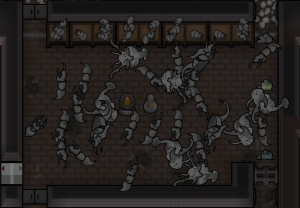IED deadlife trap
| This article relates to content added by Anomaly (DLC). Please note that it will not be present without the DLC enabled. |
| This article is a stub. You can help RimWorld Wiki by expanding it. Reason: Description also check rest ofninfobox main. |
IED deadlife trap
Base Stats
Building
- Size
- 1 × 1
- Minifiable
- True
- Placeable
- True
- Terrain Affordance
- Light
Creation
- Required Research
- IEDs
- Skill Required
- Construction
- Work To Make
- 1,400 ticks (23.33 secs)
- Destroy yield
- nothing
- thingCategories
- BuildingsSecurity
The IED deadlife trap is a building added by the Anomaly DLC that explodes into a sizable cloud of deadlife dust raising any nearby human or animal corpses as non-enemy shamblers when triggered.
Acquisition[edit]
IED deadlife traps can be constructed once the IEDs research project has been completed. Each requires ![]() 2 Deadlife shells, 1,400 ticks (23.33 secs) of work modified by the construction speed of the builder, and a construction skill of.
2 Deadlife shells, 1,400 ticks (23.33 secs) of work modified by the construction speed of the builder, and a construction skill of.
Summary[edit]
| This section is a stub. You can help RimWorld Wiki by expanding it. Reason: Missing summary besides the basic IED information template. Note the displayed AoE IS NOT the AoE of the final gas cloud, but also cloud densities may be relevant. |
Traps are single use security buildings that may be triggered when a pawn of any kind walks over it.
- The base trigger chance is 100% for enemies, including mechanoids and animals affected by the manhunter mental state. Note that despite the name, animals currently hunting a human pawn for food are not "manhunters" and are not considered enemies.
- Non-manhunting wild animals have a 5% chance to trigger the trap.
- Wild men have a 30% chance to trigger the trap.
- Colonists, tame animals, slaves and friendly mechs have 0.5% (one in 200) chance to trigger the trap.
- Friendly visitors and their animals, hostile raiders and their animals aware of your traps, as well as revenants
 and sightstealers
and sightstealers will never trigger a trap.
will never trigger a trap.
However, colonists, friendly visitors, non-manhunting animals and wild men are aware of the location of traps. On top of that, participants of sapper raids, smart raid, and smart breaching raids will know location of 30% of your traps. Anyone aware of where the traps are located will avoid pathing over them if reasonably practical. The trap's path cost is equivalent to 40 if the pawn has knowledge of the trap. One notable exception is roped animals being dragged by a handler - the rope limits their movement, overriding their usual behavior.
Prisoners are considered to be their original faction for the purposes of traps. Enemy who you have taken prisoner will retain their 100% trap trigger rate and will ignore traps when pathfinding. Colonists that you have taken prisoner retain their 0.5% trap trigger rate, even during a prison break, and will avoid traps whenever possible.
In all instances, a pawn's trap spring chance stat multiplies the above trigger chances for that pawn. Currently, the only thing that does this is the Nimble trait which multiplies the chance by 10%, that is, a 10% chance for nimble enemies, 0.05% chance for nimble colonists, and 3% chance for nimble wild men.
IEDs can also be triggered when hit by a projectile dealing the Bullet, Arrow, or ArrowHighVelocity damage type, or when damaged below 20% of their maximum HP.
Analysis[edit]
| This section is a stub. You can help RimWorld Wiki by expanding it. Reason: General,specific strategies with images if necessary, value proposition etc. |
IED deadlife traps can be utilized near corpse stockpiles to reanimate them into Shamblers either triggered by a bullet shot or by an enemy, creating a "corpse trap" drawing the victim's attention and converting more enemies as they succumb to the horde, otherwise they can synergize with other traps such as regular IED traps to reanimate what was freshly killed albeit at the cost of rotting the corpses and forfeiting any leathers and meat that would have been gained, and any survivors could have further risk of a Metalhorror implantation if captured. [Check]
Properly prepared and sufficiently large corpse rooms can end entire raids by themselves, even at high difficulties. The cost of ![]() 50 Bioferrite per raid can be steep in the early game, but it is easily affordable in the late game, which further synergizes with larger end game raids providing more and more powerful corpses to raise as shamblers.
50 Bioferrite per raid can be steep in the early game, but it is easily affordable in the late game, which further synergizes with larger end game raids providing more and more powerful corpses to raise as shamblers.
Keep in mind that most pawns dislike seeing corpses, so maintaining the corpse room can create some mood penalties.

Version history[edit]
- Anomaly DLC Release - Added.
- 1.6.4518 - Reduced the radius of deadlife IED traps.[From what to what]

